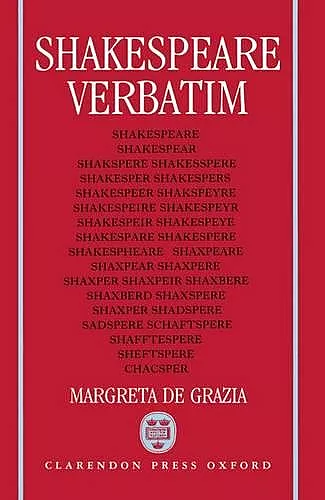Shakespeare Verbatim
The Reproduction of Authenticity and the 1790 Apparatus
Format:Hardback
Publisher:Oxford University Press
Published:7th Feb '91
Currently unavailable, and unfortunately no date known when it will be back

Shakespeare Verbatim challenges traditional Shakespeare scholarship through a study of its textual primacy in the late eighteenth century. The book's examination of earlier treatments demonstrates that concepts now basic to Shakespeare studies were once largely irrelevant. Only with Edmond Malone's 1790 Shakespeare edition do such criteria as authenticity, historical periodization, factual biography, chronological development, and in-depth readings become dominant. However, their emergence then must not be seen as the overdue installation of proper scholarly and literary procedures, but rather as a specific historical response to the problem the Shakespeare corpus has posed since its definition by the 1623 Folio. The remarkable efficacy of Malone's apparatus over the past two hundred years testifies not to its `truth', but rather to its endorsement of a continuing Enlightenment epistemology irreconcilable with the past linguistic and mechanical practices it purports accurately to reproduce. This challenging book has both practical and theoretical implications for Shakespeare studies in the 1990s and beyond.
`Shakespeare Vebatim provides a stimulating survey of the development of eighteenth-century editing and Shakespearian scholarship ... the book is the product of an acute, well-informed intelligence and deserves reading by anyone interested in the cultural production of "Shakespeare"' Review
`Her treatment of the historical development of the meaning of the "original" is fascinating. This dense and complex book offers us a great deal of freshly considered information about the publishing history of Shakespeare. ' Lachlan Mackinnon, Times Literary Supplement
`Anyone interested in biography or editing - that is, anyone interested in literary representation - should read Shakespeare Verbatim.' London Review of Books
'Anyone interested in biography or editing - that is, anyone interested in literary representation - should read Shakespeare Verbatim.' London Review of Books
'De Grazia's study illuminates a key passage in early modern Shakespearian scholarship' English Studies, Volume 73, Number 6, December 1992
'a book that is more interesting and pleasurable to read than would be a more straightforward and predictable chronology ... De Grazia's fine book poses a number of teasing paradoxes. De Grazia manages to make a history of textual studies centered on Malone's scholarly apparatus not only absorbing but vital to an understanding of our own current critical obsessions ... we have de Grazia's wise and compelling book to show us a contradictory picture of our age and its puzzlement about post-modern textual studies.' David Bevington, University of Chicago, Renaissance Quarterly
'This is an important book. It is also substantial, thorough, and detailed. It offers a model of sophisticated, theorized work on the processes by which Shakespeare has been produced for his modern admirers.' Catherine Belsey, University of Wales College of Cardiff, YES, 23, 1993
'Margreta de Grazia has written an interesting and important book. Elegantly written, clear, persuasive and well-informed both about its large subject and modern critical theory, it is a book that deserves to be read several times and that both Shakespearean and eighteenth-century scholars will have to take into account in any future discussions of the vexed question of the editing of Shakespeare.' Martin Coyule, University of Wales, Cardiff, British Journal of Eighteenth Century Studies, Spring 1993
'fine book ... The pursuit of scholarly accuracy necessary for such an undertaking has been accomplished with an expertise and thoroughness that Malone himself would, I hope, appreciate. De Grazia manages to make a history of textual studies centered on Malone's scholarly apparatus not only absorbing but vital to an understanding of our own current critical obsessions ... we have de Grazia's wise and compelling book to show us a contradictory picture of our age and its puzzlement about post-modern textual studies.' David Bevington, The University of Chicago, Renaissance Quarterly, Vol. XLV, No. 3
ISBN: 9780198117780
Dimensions: 224mm x 144mm x 19mm
Weight: 447g
256 pages